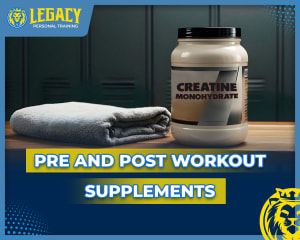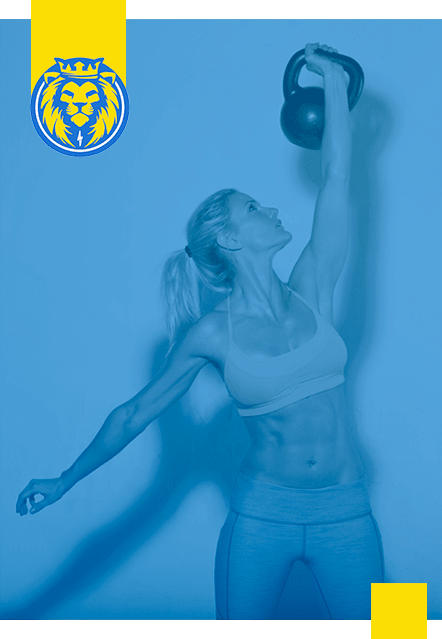
If you’ve ever walked into the gym on an empty stomach or wondered whether supplements are really necessary, you’re not alone. Many people struggle with how to properly fuel their workouts — especially those training early in the morning or after a long workday. The truth is, what you eat (or don’t eat) before and after your workout can make or break your performance, recovery, and overall results. Supplements can play a role, but they should never replace solid nutrition, sleep, and consistency. Here’s a breakdown of what actually matters when it comes to pre and post workout nutrition, how to make smart supplement choices, and what to do if you’re training while short on energy. Let’s start with what supplements really are: gap fillers, not magic solutions. They can help optimize recovery, improve hydration, or fill in nutritional gaps, but they’re never a substitute for the fundamentals — consistent strength training, good sleep, whole food nutrition, and proper hydration. At Legacy Personal Training, we help clients use supplements intentionally, not impulsively. Before you buy anything new, it’s important to understand what your body actually needs. Many people walk into the gym first thing in the morning without eating anything. The most common reason? “I’m not hungry.” The problem is, your body hasn’t had food or water for 6–8 hours while you were asleep. Starting your workout completely fasted means you’re running on empty. That leads to low energy, fatigue, and poor performance. You don’t need a full breakfast, but you do need something to give your body fuel. Even a small snack can make a big difference. Try: A banana or apple for a quick source of carbs Greek yogurt or a protein shake if you can handle something more filling A handful of berries with a small portion of nuts for balanced energy Carbohydrates are your body’s preferred energy source, especially for resistance training. Without them, your muscles don’t have the glycogen they need to perform. Remember: Carbs are not the enemy. The right kind of carbs like fruits, oats, rice, sweet potatoes, and whole grains, power your workouts and protect your metabolism. Protein is another key piece of the pre-workout puzzle. While most people think of it as a post-workout nutrient, having protein before you train can actually support better recovery. When you eat protein before lifting, your body already has amino acids available for muscle repair. That means less soreness and more effective rebuilding afterward. You can get this from: A small protein shake (whey, egg, or plant-based) A boiled egg or two Greek yogurt with fruit Timing matters: aim to eat 45–90 minutes before your session. Too close to your workout and you may feel bloated; too far and your energy may drop. If you’re sweating heavily or training for an hour or more, your body loses not just water but electrolytes - sodium, potassium, and magnesium. These minerals are essential for muscle contraction, nerve function, and maintaining energy levels. When you run low, you may feel weak, dizzy, or cramp up. To replenish electrolytes naturally, try: Adding a pinch of sea salt to your water Using an electrolyte powder with sodium, potassium, and magnesium Eating fruit like oranges, watermelon, or bananas after training Electrolytes also support the sodium-potassium pump, which powers muscle contractions and nerve signals. Without enough sodium or potassium, your muscles can’t fire efficiently, which means less strength and slower recovery. After your workout, your goal is to replenish what you lost and kickstart recovery. That means getting protein and carbs as soon as you can. Here’s what that looks like: A protein shake with 25–30 grams of protein and a banana or oats Chicken or fish with rice or potatoes Greek yogurt with fruit and honey There’s often talk about the “anabolic window,” but the reality is simple: the sooner you refuel, the better. You don’t need to chug a shake the moment you rack your weights, but try to eat within one to two hours. If there’s one supplement worth considering, it’s creatine monohydrate. Creatine helps your muscles produce energy during high-intensity exercise and supports muscle repair and growth. It also draws water into your muscle cells, improving strength and recovery. You don’t need to “load” it or take huge amounts. Just 5 grams a day is enough for most adults. Mix it with your protein shake or add it to any beverage since it’s flavorless and easy to digest. While some people worry about bloating or water retention, creatine primarily holds water inside your muscle cells (where you want it), not under your skin. Before you start buying new products, keep these things in mind: Don’t rely on supplements for results. You can’t out-supplement poor nutrition or lack of consistency in the gym. Avoid stacking too many products.Focus on one or two that fill real gaps, not everything you see online. Stay hydrated.Many supplements, including creatine, require proper hydration to work effectively. Timing matters. Protein and carbs before and after your workout are more important than fancy pre-workouts. Pre and post workout nutrition doesn’t have to be complicated. Focus on: Eating a small carb and protein combo before training Staying hydrated and replacing electrolytes during your workout Getting a solid dose of protein and carbs afterward Considering creatine for recovery and strength support At Legacy Personal Training, we help clients design routines that support real-world performance. Whether you train early in the morning, after work, or somewhere in between, fueling your body properly will help you perform better, recover faster, and stay consistent longer. Legacy Personal Training proudly serves Grayhawk and the North Scottsdale community. 📅 Book your consultation today to learn how expert coaching, personalized nutrition guidance, and smart supplementation can help you feel stronger, recover faster, and perform your best — at any age.Pre and Post Workout Supplements: What Really Matters for Energy, Recovery, and Performance
The Role of Supplements in a Smart Training Plan
Why You Need Fuel Before You Train
Why Protein Before a Workout Matters Too
During Your Workout: Hydration and Electrolytes
Post-Workout Nutrition: Recovery Starts Now
Creatine: The Most Researched Supplement You’re Probably Overthinking
Common Supplement Mistakes
The Takeaway: Nutrition First, Supplements Second

